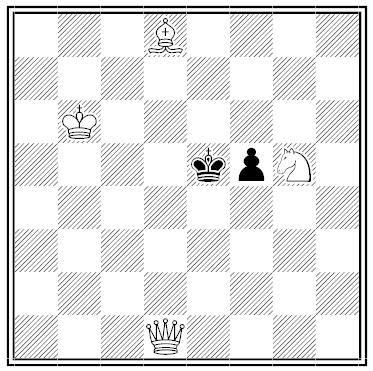“While an author is yet living, we estimate his powers by his worst performance; and when he is dead, we rate them by his best.” — Samuel Johnson
Truth in Advertising
In 1866 Mark Twain embarked on a lecture tour in California. He wrote the handbills himself:
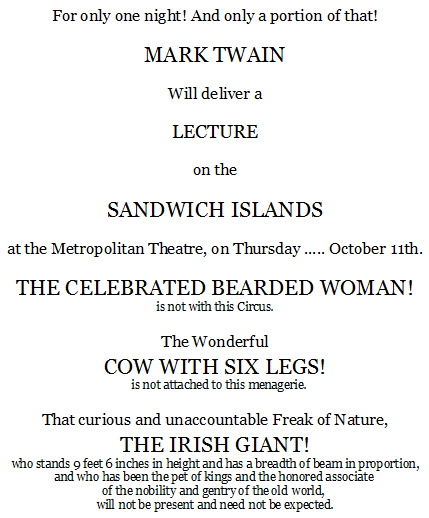
In Nevada City, he proposed to perform the following “wonderful feats of sleight of hand” after the lecture:
At a given signal, he will go out with any gentleman and take a drink. If desired, he will repeat this unique and interesting feat — repeat it until the audience are satisfied that there is no more deception about it.
At a moment’s warning, he will depart out of town and leave his hotel bill unsettled. He has performed this ludicrous feat many hundreds of times, in San Francisco, and elsewhere, and it has always elicited the most enthusiastic comments.
“The lecturer declines to specify any more of his miraculous feats at present,” he wrote, “for fear of getting the police too much interested in his circus.”
The Flatwoods Monster
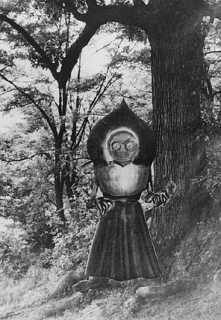
On Sept. 12, 1952, three West Virginia boys saw a floating reddish sphere drop behind a hill, where it emitted a steady glow. As they went to investigate, they were joined by a local beautician and three other boys.
A dog ran ahead of the group, barked furiously at something, and fled with its tail between its legs. The first boys to reach the site saw a “big ball of fire” among a foul-smelling mist to their right. To their left were two points of light. When one boy turned his flashlight on them, the group saw a grotesque, armless creature with a head shaped like the “ace of spades,” with a circular window through which two pale blue beams of light played.
The creature, which was more than 6 feet tall, glided toward the group at first, then turned toward the glowing ball as the group fled. When a reporter from the Braxton Democrat arrived at the scene, he noticed an unusual odor in the grass that irritated his nose and throat.
No one knows what the group saw that night, but the most likely explanation seems to be a meteor and a startled barn owl. Flatwoods held a “monster festival” in September 2002, on the 50th anniversary of the event; the alien, if that’s what it was, failed to attend.
Green Party
Letter to the Times, Aug. 19, 1930:
Sir, In one of the loveliest gardens in the West of Scotland, opened freely on certain days to a vast public from Glasgow and that neighbourhood, courteous notices everywhere intimated that ‘Visitors are requested not to pick the flowers without leave.’ A waggish tourist went round with a paint brush, adding an ‘s’ to the word ‘leave,’ with the deplorable result that not only were flowers plucked, but whole plants — flowers, leaves, and roots — were excavated and carried off.
Yours, &c.
David Hunter-Blair
Rise and Shine
In the 1650s an intriguing handbill appeared in London:
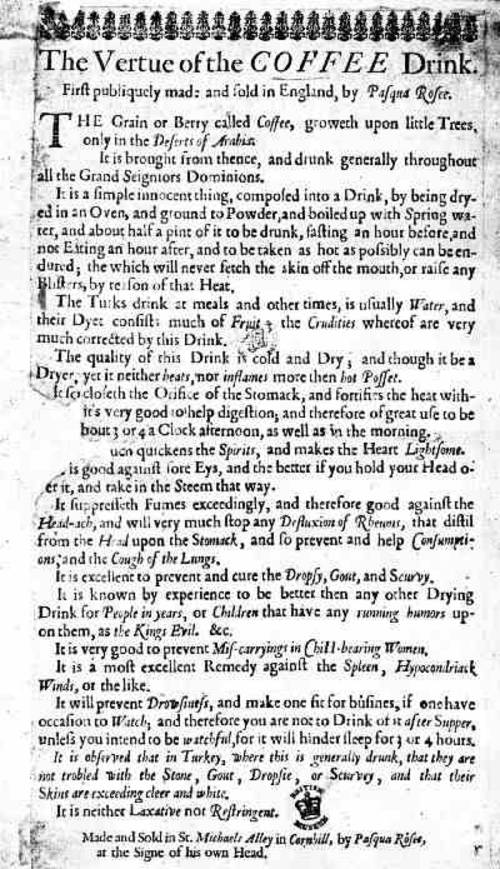
A merchant named Dan Edwards had brought the first coffee to England in 1652, and his Greek servant, Pasqua Rosee, opened the first coffee-house there. Evidently he saw some potential.
Ballot Box
In October 1956, Los Angeles mentalist Jack Swimmer declared that he would predict the exact number of votes that President Eisenhower would receive that year in the nation, in California, and in Los Angeles County. A small box containing his predictions was placed in a larger box, which was locked in a county safe on Oct. 10, and Swimmer deposited $5,000 with the county board of supervisors, saying they could give it to charity if he failed.
On Nov. 13, a week after Election Day, the supervisors opened the smaller box and found a tiny roll of paper on which were written three numbers:
33,974,241
2,875,637
1,218,462
These corresponded exactly to the published totals. The board returned Swimmer’s money, and he donated it to charity anyway, saying he was happy with his “small part in bringing out the vote.”
Swimmer wouldn’t say how he had accomplished the feat, though he said there was nothing supernatural about it. “Some of the spectators later said the tiny roll of paper on which the figures were written could have been hidden in a hollow key and injected into the box when it was unlocked,” noted a UPI account. “But by the time they thought of it, the key was no longer available for inspection.”
Topsy Turvy
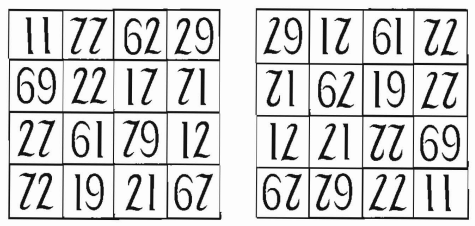
This reversible magic square comes from Henry Dudeney’s Canterbury Puzzles.
Each row, column, and diagonal in the square totals 179.
Thanks to some clever calligraphy, this remains true when the square is turned upside down.
So It Goes

The last great auk in the British Isles was killed because its keepers feared it might be a witch. In 1840 five men discovered it asleep on the Scottish island of Stac an Armin. From John Alexander Harvie-Brown’s Vertebrate Fauna of the Outer Hebrides (1888):
It was Malcolm M’Donald who actually laid hold of the bird, and held it by the neck with his two hands, till others came up and tied its legs. It used to make a great noise, like that made by a gannet, but much louder, when shutting its mouth. It opened its mouth when any one came near it. It nearly cut the rope with its bill. A storm arose, and that, together with the size of the bird and the noise it made, caused them to think it was a witch. It was killed on the third day after it was caught, and M’Kinnon declares they were beating it for an hour with two large stones before it was dead: he was the most frightened of all the men, and advised the killing of it.
They threw the body behind the hut and left it there.
When the last heath hen, “Booming Ben,” died in 1932 on Martha’s Vineyard, local newspaper editor Henry Beetle Hough wrote an obituary for the species: “There is a void in the April dawn, there is an expectancy unanswered … We are looking upon the utmost finality which can be written, glimpsing the darkness which will not know another ray of light. We are in touch with the reality of extinction.”
Black and White
Elsewhere
Notable cross-references in the index of Donald Tovey’s Essays in Musical Analysis, Volume VI, 1939:
Agnostic, see Dachsund.
Appendicitis, see Cadenza.
Critics, see Experts.
Experts, see Critics.
Giraffe, see Berlioz.
Hedgehog, see Brahms.
Monster, see Loch Ness.
Noodles, see Brahms on plagiarism.
Pope, see Bruckner.
Sneeze, see Cherubini and Beethoven.
Sugar, see Grocer.
Witchery, see Mendelssohn.
Evelyn Waugh owned a translation of Tolstoy’s novel Resurrection for which someone had composed “a particularly felicitous index. The first entry is: ‘Adultery, 13, 53, 68, 70’; the last is ‘Why do people punish? 358’. Between them occurs such items as: Cannibalism, Dogs, Good breeding, Justification of one’s position, Seduction, Smoking, Spies, and Vegetarianism.”
See Memorable Indexes, More Amusing Indexes, Reference Work, and “He Suddenly Dropt Dead of Heart-Disease.”

